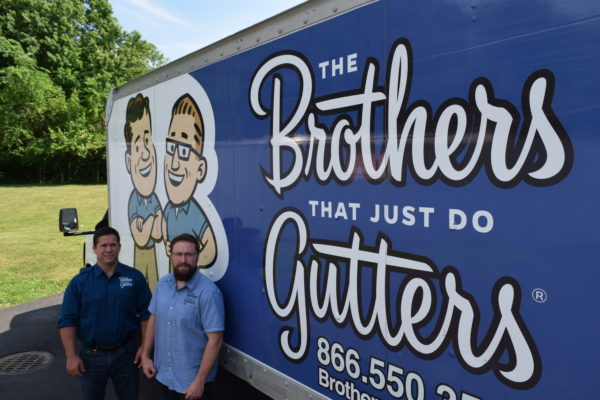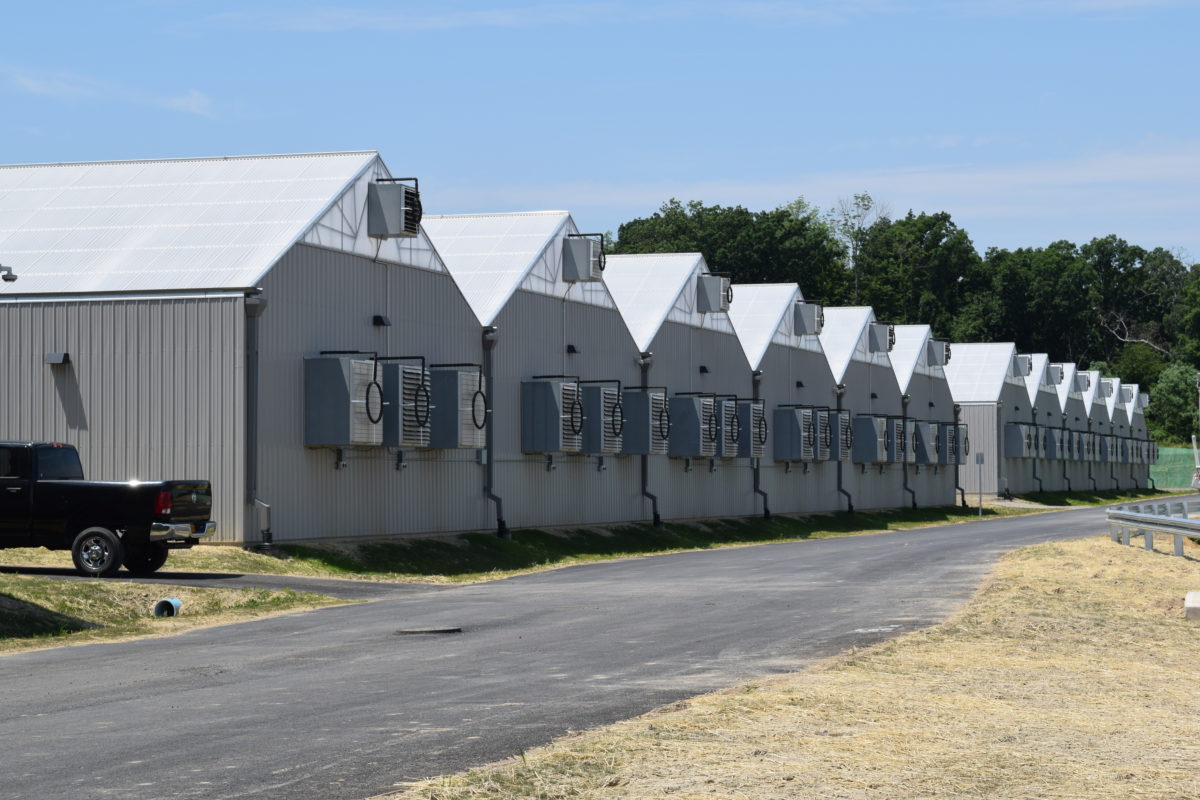Ken and Ryan Parsons have learned the value of a catchy name in business. They are brothers, three years apart in age, and partners in a contracting business in Dutchess County. They are The Brothers That Just Do Gutters, as it says on their business cards.
It hasn”™t been an easy haul, but they”™ve found their niche in the up-and-down construction industry. Theirs is a kind of business with the kind of name you can franchise ”” and the brothers, whose systematically well-trained crews just do gutters, have begun doing just that.
Perhaps you”™ve seen their eye-catching service trucks plying the roads of Dutchess, Putnam, Westchester and Orange counties in the Hudson Valley and western Connecticut. Those are the smooth-shaven, smiling Parsons brothers painted in caricature on the sides of the six to eight trucks they send out within a roughly 50-mile radius from Billings Plaza, a small retail and office strip in the town of LaGrange. Ken, the elder brother and founder of the business, is the darker-haired cartoon character with folded arms; Ryan, the one wearing glasses, sports a beard these days.
“That”™s been real helpful,” Ryan said of their trademarked company name, which began as a tagline in their company”™s radio ads. Hearing the ads, prospective customers called their office asking for “the Gutter Brothers” or “the Brother Gutters,” he said.
In any case, the tagline proved memorable, however imperfectly, to those who heard it. “That”™s been marketing gold,” he said.
The partners several years ago had changed their business name to Waterflow Gutter Solutions when a gutter manufacturer asked them to stop using Waterfall Seamless Gutters, the name by which Ken Parsons launched the business in 1998. With that prior name change, “That”™s when we came up with the titles ”” ”˜solutionists”™,” Ryan said.
The company”™s three salespersons have that title. “Ken is the Senior Solutionist,” said Ryan, “and I”™m the Chief Solutionist.”
“We still haven”™t figured out which one”™s more important,” said Ken.
A middle-school history teacher for three years, “I just couldn”™t see myself doing that for the next 25 years,” said Ken, who with his younger brother grew up working in their father”™s construction business. Offered a summer job from a gutter installer in the area, “I started to see, wow, there”™s something to this business,” said the dissatisfied teacher. “It”™s like a factory on wheels. It was enjoyable work. It was different.”
He did not return to the classroom that fall. Instead he invested $500 in a 16-foot box truck as his factory on wheels and picked up a free gutter machine for the one-man business he opened in his mother”™s garage. A shoebox in which bills were separated into “Paid” and “Unpaid” stacks was his accounting system.
“It broke down probably, like, 15 to 20 times that first year,” Ken said of the company vehicle. “I did a lot of advertising from the back of a tow truck.”
“I had no business education,” said Ken, whose company has evolved from a simple DBA at its formation to an S corporation with about 30 employees in Dutchess County. “I just knew how to work my ass off.”
An art and graphic design major at SUNY New Paltz, Ryan Parsons after graduation went to work at a Kingston company in 2000.
“They were a dot-com dot-bomb,” he said. “Real exciting stuff. We were going to take over the world. Before you know it, I”™m literally working for free” and living in his parents”™ attic. In the economic wake of 9/11, “We were done.”
Ryan did not want to do gutters but he went to work, starting with “glorified chores,” for his overworked older brother.
He began designing a company website ”” the Gutter Brothers were “light years ahead of everyone in our industry on the web,” he said ”” and used a software program “to get an accounting system going. I did it all wrong because I didn”™t know what I was doing.”
The business had one cell phone in Ken”™s keeping. In the field, Ryan would call Ken from a phone booth for advice and then return to the job.
The brothers found their skills complemented one another”™s in business.
“Ryan”™s good at putting a lot of the details to the ideas that I have,” said Ken. “I”™m a visionary, big ideas ”” let”™s conquer the world. And he reins that in a bit, says, ”˜OK, we”™re going to do that but let”™s do this first.”™”
Ken offered Ryan a 30 percent ownership stake in the business if he bought the company”™s first new truck. Ryan agreed to the terms. In 2004, the company expanded to two trucks with crews.
“Growing from one to three trucks is the hardest thing we have found in our industry,” said Ken, “and it”™s typically the hardest thing that contractors face.”
Working with an uncle, the brothers about 12 years ago ventured into general construction while continuing to operate their gutter business. It was a wrong turn.
“There was no management,” said Ryan. “We were terrible.” The floundering construction company was draining revenue from their gutter business.
By mid-2007, the Parsons saw that the region”™s construction boom was ending. They were not being paid by contractors. About 70 percent of their gutter business came from new construction projects by national clients such as Lennar, Toll Brothers and Home Depot and smaller contractors in the area. They closed their construction business and were forced to lay off some top employees.
“We were in trouble,” said Ryan.
“Any person that had business sense would have told us to bankrupt at that point,” said Ken.
But the Parsons saw their choice as either scaling back to a two-man business as owners-installers or trying to make their gutter business “bigger than anything in the country,” he said. Instead of declaring bankruptcy, they secured a $150,000 line of credit.
“We wanted to get back in front of homeowners where we started,” said Ryan. “We gave it one more year to really try to make it into a business.”
In the grip of the Great Recession, “Everybody cut their marketing,” he said. “We said, we can”™t. We”™ve got to increase our marketing if we want to survive.”
They also raised their quoted price to clients to $5 a foot after their bookkeeper said they would have to charge a minimum of $4 a foot to stay in business ”” at a time when competitors were charging $3 to $3.25 a foot, Ken said. Clients did not blink.
“That was a big turning point in my head,” he said. “We started learning that it”™s not so much about the product, but it”™s about the value and experience you”™re providing your client. We want to reinvent the contractor experience for clients.”
In 2011, the Parsons hired a business coach recommended by another contractor. “That”™s when we really started to get it together,” Ryan said.
From its Dutchess County base, the company does about 2,000 jobs and about $3 million in revenue a year.
The brothers in 2011 opened two locations in New Jersey and Virginia ”” respectively run by Ryan”™s brother-in-law and their sister”™s husband ”” which have since become franchises of The Brothers That Just Do Gutters. The company launched two more franchises last year and aims to sell two this year.
Franchise owners typically pay from $25,000 to $35,000 to acquire a territory, Ryan said. “They”™ve got to come to the table with about $100,000,” which typically includes $35,000 to $40,000 in working capital, he said.
Drawing on their extensive business reading and with the aid of their business coach, the brothers have systematized their sales process and employee training. A four-desk call center in their Billings Plaza office handles phone calls from clients and does job scheduling for franchise owners. The call center and technology developed by the company frees franchise owners to train their employees and concentrate on developing their local business, Ryan said.
He said the company would like to extend its franchise reach to Albany, Connecticut, New Jersey”™s Bergen County and Pennsylvania, where a former employee from Kenya opened a franchise in Allentown last year.
“But with the technology, we can go anywhere,” Ken said.
Five years ago, the brothers started a “skills ladder” system for training and promoting crew workers, from apprentice on the lowest rung to field supervisor at the top. Employees are given skills manuals that list in detail the requirements of their jobs, including topics such as “dumpster optimization” and “jobsite setup.” The training includes required reading and employees present oral book reports in front of their colleagues. Workers receive pay raises when completing all requirements for their positions. Employees on higher rungs of the skills ladder must train new employees in order to get their next promotion.
The brothers plan to add video and online classroom learning to the skills ladder program and will monitor employees”™ progress online.
Their proprietary training system works well, they said.
“It changed our culture,” said Ryan, and has allowed the partners to “get out of the hourglass” and off their company trucks as installers.
“We”™ve got awesome guys as a result of it,” said Ken. “I can safely say that 90 percent of guys who work for us wouldn”™t have been able to cut it in the traditional construction environment.”
Of the factors that have kept their company out of the gutter of small-business failures, the name ”” The Brothers That Just Do Gutters ”” “is the most important,” Ken Parsons said. It has attracted interest from investors as well as customers.
“We”™ve had guys reaching out to us from across the country,” said Ryan. “They just want to do something with us ”” they love the name.”
“The name is gigantic,” he said. “What a home run on that.”





















